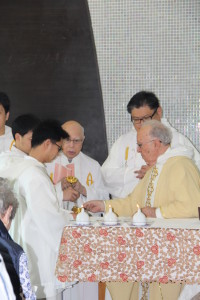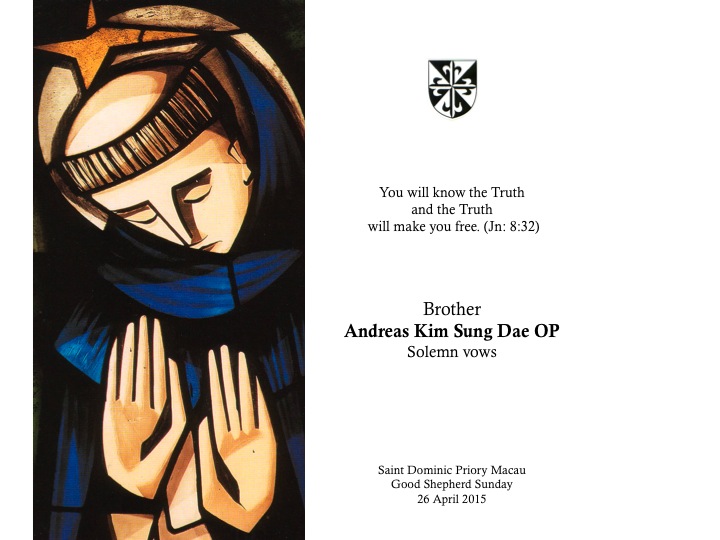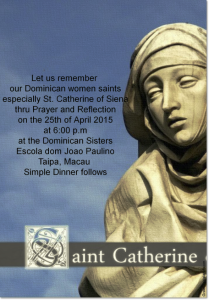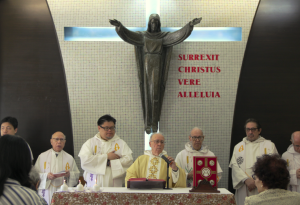
 The Catholic Church and the death penalty today
Capital punishment is growingly considered in contemporary society as a crime against the inalienable right to life of every individual. Certainly, the number of countries that still have the death penalty in their penal codes is diminishing: about fifty today compared with one hundred twenty years ago. By the way, Macau is among the nations that have abolished the death penalty from its penal code.
In the Church, more and more Christian communities and individual Catholics label capital punishment as another inhuman and unchristian expression of the culture of death. How does the Church see the death penalty today?
Capital punishment is a crime against the right to life and – for most believers –, it is also against the sacredness of life, which belongs to God, the Lord of life and death. It is, moreover, against love of neighbour, solidarity. Like most cultures and societies, the Church was in favour of the death penalty yesterday. Is the Church in favour of capital punishment today?
Capital punishment is not mentioned in any Vatican II document. In the 1960s, the Church was silent. Pope Pius XII was the last Pope to speak explicitly in favour of the death penalty. The official silence of Vatican II – a significant silence – was continued by John XXIII and Paul VI. In the last half of the twentieth century, many ethicists and theologians were speaking for the abolition of the death penalty, and also the pro-life movement in the Church, which is steadily growing
There was some hesitation on the issue of the death penalty in the first edition of the Catechism of the Catholic Church (CCC, The Vatican, 1992), although it was basically and generally against capital punishment and its application. There was a diminishing hesitation in John Paul II’s Evangelium Vitae (EV, 1995, no. 56) and in the final edition of CCC (The Vatican, 1997, no. 2267). John Paul II writes in his pace-setting encyclical on the Gospel of Life: “Human life must be defended from the moment of conception to natural death†(EV 21, 28, 29, etc.), but still the door to the death penalty was not totally closed: The offender may be executed in cases of absolute necessity, “which are very rare if not practically non-existent†(EV 56).
St. John Paul II was the first Pope to speak openly – during the last fifteen years of his Pontificate and in a progressive rhythm – against the death penalty. By 1999, John Paul II defended clearly a consistent-life-ethic, that is, an ethics that respects life at its beginning and natural end, an ethics that is, therefore, not only against abortion and euthanasia and suicide and homicide, but also against the death penalty. By then, John Paul II was absolutely against capital punishment as was clearly stated in his homily in St. Louis, Missouri on November 7, 1999. “The new evangelization calls for followers of Christ who are unconditionally pro-life: who will proclaim, celebrate and serve the Gospel of life in every situation… The death penalty is cruel and unnecessary.â€
Benedict XVI has repeated that life must be defended up to “natural death.†In Caritas in Veritate, he writes: “If there is lack of respect for the right to life and to a natural death…, the conscience of society ends up losing the concept of human ecology and, along with it, that of environmental ecology†(VC 51). Pope Benedict XVI used the ethical principle of a consistent-life-ethic: “Human life ought to be defended from the moment of conception to natural death.†Obviously, the death penalty is not natural but violent.
Pope Francis has been consistently and openly against the death penalty since the time he was the archbishop of Buenos Aires. Let me quote some of his words from his latest statement on the matter:  his Letter to the President of the International Commission against the Death Penalty (The Vatican, March 20, 2015). The Argentinian Pope writes: “Today capital punishment is unacceptable, however serious the condemned’s crime may have been. It is an offence to the inviolability of life and to the dignity of the human person which contradicts God’s plan for man and for society and his merciful justice, and it fails to conform to any just purpose of punishment. It does not render justice to the victims, but rather foments revenge… Justice is never reached by killing a human being… There is no human form of killing another person.â€
Capital punishment is vindictive not medicinal or restorative punishment. I remember the words of Gandhi: “An eye for an eye and a tooth for a tooth will leave the whole world blind and toothless.†Is the application of the death penalty, a deterrent to crime? Albert Camus writes incisively: “Murder has been punished with execution for centuries, yet the race of Cain has not disappeared.†A text written on a T-shirt that became very popular reads: Why kill to show that killing is wrong?
The defence and promotion of human life in a consistent manner include the beginning of life (against abortion), its end (against homicide, suicide, offensive war and the death penalty), and in-between its beginning and end (against poverty, injustice, violence, terrorism, human trafficking, and the exploitation of the environment.
I will never forget the lesson given by a first year medical student in Manila who said to me in our class in bioethics: “Father, I am in favour of the death penalty for criminals who murder people.†I asked her: “Are you a Christian?†The young girl responded: “Yes, I am a Catholic.†There is a crucifix in our classroom (the school is the Catholic University of Santo Tomas), so while pointing to the crucifix I asked her: “Do you see Christ on the cross? What do you think? Is Jesus Christ in favour or against the death penalty for criminals who murder – for any criminal? After a short pause (one could hear the silence of the whole class), she answered: “I think that Jesus is against the death penalty for anyone.†After another sounding silent pause she added: “Then, I am also totally against the death penalty.â€
With all due respect I ask: how may a believer in Jesus proclaim the Sermon on the Mount and be in favour of the death penalty today? (cf. Mt chaps. 5-7). “You have heard how it was said to our ancestors: You shall not kill; and if anyone does kill he must answer for it before the court. But I say to you, anyone who is angry with a brother will answer for it before the court.†“You have heard how it was said: Eye for eye and tooth for tooth. But I say this to you: offer no resistance to the wicked. On the contrary, if anyone hits you on the right cheek, offer him the other as well.†“You have heard it was said: You will love your neighbour and hate your enemy. But I say this to you: love your enemies and pray for those who persecute you, so that you may be children of your Father in heaven†(Mt 5: 21-22, 38-39, 43-45).
As a human being, a member of the human family, I am against capital punishment: it is against love of neighbour, which is the meaning and value of life; it is against human dignity and the right to life of every human being; it is an incredible torture. As a Christian, a follower of Jesus of Nazareth, I am radically and absolutely against the death penalty: God is the Lord of life and death; life is sacred; a;; others are my brothers and sisters, Jesus is my way and my life.
Every man’s death diminishes me…
Therefore, never send to know for whom the bell tolls.
It tolls for thee (John Donne).
(This article was published by O Clarim, Macau Catholic Weekly, April 17, 2015, p. 5)
Fausto Gomez, OP
Macau, April 2015
St. Catherine of Siena’s Feast

Formators’ Council meeting
The Province’s Annual Asian Formators’ Council Meeting was held in our Priory of St. Dominic on April 7, 2015. Presided over by our Provincial,  fr. Javier González, OP, it was attended by the following brothers: From Hong Kong, Hyacinth He, Timoteo Merino and Fernando Muñoz; from China, Paul Fan; from Korea, John Kim; from Myanmar, Hilario Plureth; from the Philippines, Raymond Mi; from Japan, Mariano González. Moreover, the brothers of the Formation Commission of St. Dominic’s Priory, Macau, were also present: Jarvis Sy, José Luis de Miguel, Edmond Eh and Fausto Gómez. As the secretary of the Province, fr. Fernando Muñoz acted as secretary for the meeting.
It was very interesting and hopeful to come to know well the reality of initial formation in the different vicariates, priories and houses and centers of formation of the Province in Asia. We have at present a good number of pre-novices (aspirants and postulants), novices, and students in the different stages of formation. The beauty of the meeting was the rich input coming from our brothers working with our formandi in the different places of work and mission of the Province, in particular in Asia.
The community, including in particular our student brothers, was very happy to invite them for lunch and supper. It was a joyful occasion to sharing ideas on and concerns for initial and permanent formation.
The members of the Formators’ Council of the Province were asked by fr. Javier to send to him comments on the draft of the new Ratio Formationis Generalis of the Order. He will then send comments and suggestions to the Dominican curia in Santa Sabina, Rome.
The brothers representing East Timor, Taiwan, Venezuela, Spain and Italy were not able to make it to the annual meeting this time. We missed them and their enriching contribution to the annual meeting on formation. They were with us in spirit and hopefully will be able to attend and participate next time.

Homily, Easter Sunday
Easter Sunday! It is the greatest feast for Christians, for us! St. Paul tells us that if Jesus had not risen, our faith would be in vain, and our hope – and heaven. God indeed raised Jesus from the dead. Hence, our faith in him, our hope in our resurrection is true. Easter is pascha, or passage from death to life, from Good Friday to Easter Sunday. The Easter candle tells us that Jesus is raised and lives and that He is our light and life! Indeed, we are Easter people.
Let us meditate briefly on the message from the Word we have just proclaimed.
First Reading: Acts 10:34, 37-43. Peter proclaims the central content of apostolic preaching: the Jesus event. He died, rose from the dead and lives. Therefore the disciples of Christ – like Peter and the other apostles – have to be witnesses of the resurrection of Christ.
Second Reading: Col 3:1-9. Paul tells us that in Christ, we are raised. Look therefore for the values above, that is, the values of the Kingdom of God. Not to escape from the world, but to transform the world with the values of equality, justice, solidarity, prayer, compassion, forgiveness. As raised in Christ, we have to try always to be dead to sin and alive in love for God in Jesus Christ.
The Holy Gospel: Jn 20:1-9. John’s narrative of the empty tomb: Mary Magdalene was the first to see it, and afterwards Peter and John. John saw and believed: his great love gave him a deeper way of knowing, as it is clear also in the life of the mystics; the beloved disciple was the first to believe in the resurrection of Jesus. The tomb where Christ was buried is empty; He is not there. (Parenthesis – It was said then that a friend asked Joseph of Arimathea: Why did you give your great and beautiful tomb to someone else to be buried in your tomb?†Joseph of Arimathea answered: “Oh, he asked me if he could use it for the weekend!â€) On the third day, the Lord was not there: the tomb was empty. For those who believe and love – like for John the Evangelist – the empty tomb is an argument for the resurrection of Christ. Other arguments of faith are the appearances of Jesus to the disciples. The apostles reluctantly accepted first, and little by little, the resurrection of Christ: that the Risen Lord was the same crucified Lord – gloriously different but the same Jesus. Afterwards, they incredibly lived their faith in the resurrection powerfully and joyfully. The change that took place in the apostles is an argument of faith to believe in the resurrection: before Easter, they were afraid and sad; after Easter, they are courageous and joyful in proclaiming the death and resurrection of Christ – and in suffering and dying for their faith in him.
For each one of us, the reason for our belief in the resurrection of Christ is our faith, God’s great gift to us.
Following the apostles and first disciples of Jesus, we believe in Christ’s resurrection: it is the core of our faith. Remember the Gospel I preach, St. Paul tells Timothy, “Jesus Christ risen from the dead†(2 Tim 2:8). We are asked by our faith in Jesus to be witnesses of his resurrection.
To be witnesses of the resurrection, to be able to say “I have seen the Lord,†is to have experienced an encounter with the Risen Lord. Our faith is not a doctrine or a morality but the paschal experience. How did the first Christian communities experience the Risen Lord’s transforming presence? “They remained faithful to the teaching of the apostles, to fraternity, to the breaking of the bread, and to prayer. They shared their food gladly and generously, praised God and were looked up by everyone†(Acts 2:42, 46-47).
Where may we encounter the Risen Lord today? The encounter of faith with Jesus may take place in our community prayer: “Where two or three gather in my name, there I am in their midst†(Mt 18:19-20). We may experience the Risen Lord in God’s Word, the Sacred Scriptures, especially when proclaimed in the Church, the community of disciples. We can experience Jesus in the breaking of the Bread, like the disciples to Emmaus (Lk 24:32). We may encounter Jesus, moreover, when we feed him in the poor, heal the wounded on the road of our life (cf. Mt c. 25). Radically, we encounter the Risen Lord in the practice of love of neighbor: “We are well aware that we have passed over from death to life because we love our brothers†(1 Jn 3:14).
One encounter with the Risen Lord leads us necessarily to the others. The different encounters call and fertilize each other, and aid us to grow in union with the Risen Lord.
We believe in Christ’s Resurrection. We have been preparing through Lent and especially in Holy Week for this day: Easter Vigil/Sunday. I ask myself: Do I have a strong desire and hope to be raised by God in Jesus and the joy to live as witness of the Crucified and Risen Lord? Someone says that we shall have as much resurrection as death – death to our old self of sin and darkness and un-love, and resurrection to life and love and forgiveness and compassion.
It has been said that “The statement ‘Jesus is risen’ is only fully true when, saying it, it revolutionizes my personal life.â€Â We hope and pray that our faith in Jesus’ resurrection does change our life a bit. Our faith in Christ’s resurrection, and therefore in ours, too (2 Cor 6:14); our faith in Christ’s resurrection grows little by little, like the grass in the field, like a tree: through an act of kindness, a greeting smile, a silent presence, a gesture of loving concern, a prayer of petition.
A friend sent to me the following text, which I wish to share with you:
I know that Christ is risen…
- Because I have experienced forgiveness.
- Because He has placed in my heart a fountain of joy that no one can take away.
- Because I feel a great love for my brothers and sisters.
- Because I notice that the flower of hope is always fresh.
- Because He takes away my fears and I never feel alone.
Indeed, Christ is risen and will always be with us. We hope and pray that you and I see him through this Easter season in a clearer manner. My brothers and sisters: may we all have a Happy Easter, and may those around us notice it by the way we treat them with simple kindness and joyful compassion. Let us never be afraid. Let us be joyful. How wonderful to be able to shout:
We are Easter people and Alleluia is our song. Alleluia, that is, praise the Lord!
 
Fausto Gómez, OP
St. Dominic’s Priory
Macau, April 5, 2015



